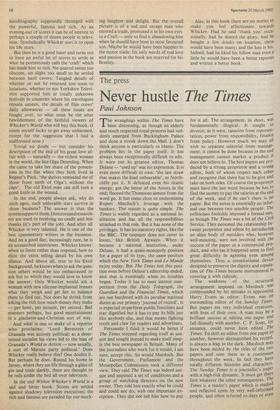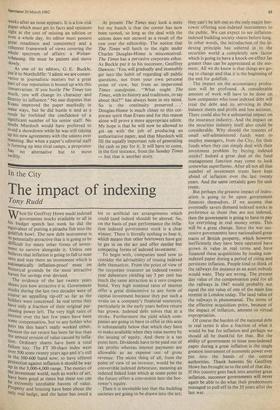The press
Never hustle The Times
Paul Johnson
The wranglings within The Times have been distressing, as though an elderly and much respected royal princess had sud- denly emerged from Buckingham Palace and done a streak down the Mall. I don't think anyone is particularly to blame. The problem lies in the paper itself. It has always been exceptionally difficult to edit. It wore out its greatest editor, Thomas Delane — 'used up' was his expression. It is even more difficult to own: 'the last straw that makes the load unbearable', as North- cliffe put it. It defeated even his titanic energy; got the better of the Astors in the end; floored the Thomsons almost from the word go. It has come close to undermining Rupert Murdoch's leverage with the bankers. The reason is quite simple. The Times is widely regarded as a national in- stitution and has all the responsibilities attached to that role. But it has none of the privileges. It has no statutory rights, like the the BBC. The taxpayer does not cover its losses, like British Airways. When it became a national institution, under Delane, it had a quasi-monopoly position for a paper of its type, the same position which the New York Times and Le Monde enjoy today. But The Times lost this posi- tion even before Delane's editorship ended, and that is essentially when its troubles began. Today it has to meet intense com- petition from the Daily Telegraph, the Guardian and the Financial Times, which are not burdened with its peculiar national duties as our primary 'journal of record'. It is expected to perform public functions and stay dignified but it has to pay its bills just like anybody else, and that means fighting tooth and claw for readers and advertisers.
Personally I think it would be better if The Times stopped regarding itself as uni- que and sought instead to make itself simp- ly the best newspaper in Britain. Many of the journalists who work for it would, I am sure, accept this. So would Murdoch. But the Government, Parliament and the Monopolies Commission took a different view. They said The Times was indeed uni- que and imposed a set of conditions and a group of watchdog directors on the new owner. They told him exactly what he could and could not do, with one important ex- ception. They did not tell him how to pay for it all. The arrangement, in short, was fundamentally illogical. It sought to divorce, as it were, taxation from represen- tation, power from responsibility, finance from policy. However much we may all wish to separate editorial from manage- ment, it cannot be done because in the end management cannot market a product it does not believe in. The best papers are pro- duced by a strong proprietor and a strong editor, both of whom respect each other and recognise that there has to be give and take on both sides. Of course the proprietor must have the last word because he has to find the money to pay the salaries at the end of the week, and if he can't there is no paper. But the nexus is essentially an infor- mal one between two sensible people. The politicians foolishly imposed a formal one, as though The Times was a bit of the Civil Service. They poisoned the relationship be- tween proprietor and editor by introducing an alien body of outsiders who, however well-meaning, were not involved with the success of the paper as a commercial pro- duct, and who (as it happens) seem to find great difficulty in agreeing even among themselves. Thus a constitutional device designed to preserve the dignity and reputa- tion of The Times became instrumental in covering it with ridicule. The weakness of the structural arrangement imposed on Murdoch was compounded by his mistake in appointing Harry Evans as editor. Evans was an outstanding editor of the Sunday Times. But papers are very individual creatures, with lives of their own. A man may be a brilliant success at editing one paper and fail dismally with another. C. P. Scott, for instance, could never have edited The Times. To shift an editor from one paper to another, however distinguished his record, is always a leap in the dark. Murdoch maY have been misled by the titles of the two papers and seen them as a continuum throughout the week. In fact they have totally different histories and characters. The Sunday Times is a journalist's paper with a high-risk dynamic. It must get there first whatever the other consequences. The Times is a reader's paper which is studied and reflected upon by very well-informed people, and often referred to days or even weeks after an issue appears. It is a low-risk Paper which must get its facts and opinions right at the cost of missing an edition or even a whole day. Its editor must possess great steadiness and consistency and a coherent framework of views covering the whole spectrum of affairs: a Weltan- schauung. He must be patient and move As one of its editors, G. E. Buckle, put it to Northcliffe: '1 admit we are conser- vative in journalistic matters but a great part of our reputation is bound up with this Conservatism. If you hustle The Times too much, you will change its character and destroy its influence.' No one disputes that Evans improved the paper markedly in some ways, but he did hustle it and as a result he forfeited the confidence of a significant number of his senior staff. No doubt Murdoch would have preferred to avoid a showdown while he was still tidying tiP his new agreements with the unions over manning. But when a paper's editorial staff is forming up into rival camps, a proprietor has no alternative but to move swiftly. At present The Times may look a mess but my hunch is that the corner has now been turned, so long as the deal with the unions does not unravel as a result of the row over the editorship. The notion that The Times will lurch to the right under Charles Douglas-Home is misconceived. The Times has a pervasive corporate ethos. As Buckle put it to his successor, Geoffrey Dawson: 'You will gradually and insensibly get into the habit of regarding all public questions, not from your own personal point of view, but from an impersonal Times standpoint. "What ought The Times, with its history and traditions, to say about this?" has always been in my mind. So is the continuity preserved .. Douglas-Home is much closer to this cor- porate spirit than Evans and for this reason alone will prove a more appropriate editor. My hope is that he will now be allowed to get on with the job of producing an authoritative paper, and that Murdoch will fill the equally important role of generating the cash to pay for it. It will have to come, in the first instance, from the Sunday Times — but that is another story.



































 Previous page
Previous page